Joaquín “El Chapo” Guzmán Captured, A Third Time

January 8, 2016
Share
Six months after his second escape from prison, Joaquín”El Chapo” Guzmán Loera, one of Mexico’s most notorious drug lords, has been recaptured by Mexican authorities, according to media reports.
The news broke with Mexican President Enrique Pena Nieto tweeting that Guzmán had been detained, tweeting in Spanish: Mission accomplished: We have him.
Misión cumplida: lo tenemos. Quiero informar a los mexicanos que Joaquín Guzmán Loera ha sido detenido.
— Enrique Peña Nieto (@EPN) January 8, 2016
Guzmán was captured when — following a tip — Mexican marines raided a home in Los Mochis, according to a statement from the Mexican Navy. An official told the Associated Press that Guzmán was arrested after a shootout in which five people were killed, and one marine was wounded. The Mexican Navy said two armored vehicles, eight rifles, and a rocket-propelled grenade launcher were seized in the raid.
Guzmán, head of the Sinaloa cartel, made international headlines when he escaped from a maximum-security prison in Mexico last July. Officials said he used a narrow opening in his prison’s shower that connected to a mile-long tunnel to escape. The opening, officials said, was the only part of his cell without security cameras.
In September, a Mexican court charged four criminal justice officials for failing to sound the alarm once he escaped, an allegation that only added fuel to the public’s suspicion that the escape was an inside job.
Guzmán’s escape last July was the second time he had managed a prison break. He’s believed to have escaped in 2001 by hiding in a laundry cart, and remained a fugitive until his capture in February 2014. Throughout his stints in prison, the Sinaloa cartel has maintained its position as Mexico’s largest trafficker of cocaine, heroin and methamphetamines, and the source of violence blamed for thousands of deaths across the country.

Related Documentaries
Latest Documentaries
Related Stories
Related Stories
Explore
Policies
Teacher Center
Funding for FRONTLINE is provided through the support of PBS viewers and by the Corporation for Public Broadcasting, with major support from Ford Foundation. Additional funding is provided the Abrams Foundation, Park Foundation, John D. and Catherine T. MacArthur Foundation, Heising-Simons Foundation, and the FRONTLINE Trust, with major support from Jon and Jo Ann Hagler on behalf of the Jon L. Hagler Foundation, and additional support from Koo and Patricia Yuen. FRONTLINE is a registered trademark of WGBH Educational Foundation. Web Site Copyright ©1995-2025 WGBH Educational Foundation. PBS is a 501(c)(3) not-for-profit organization.





















